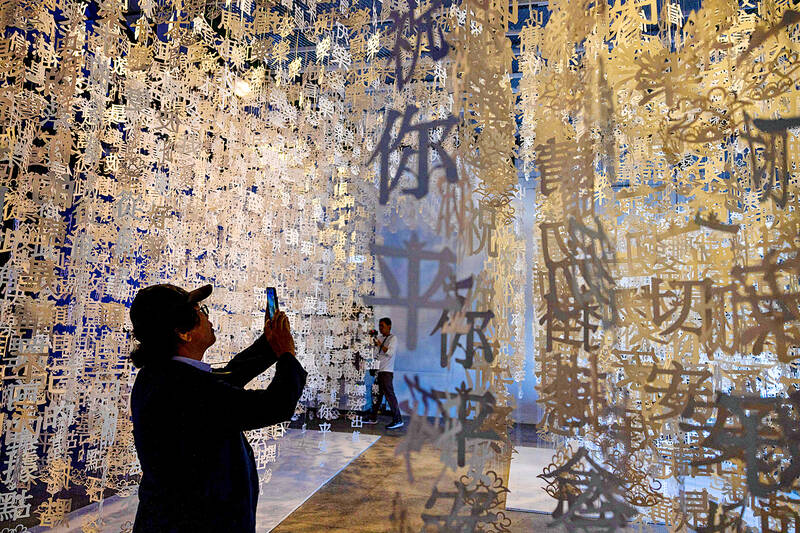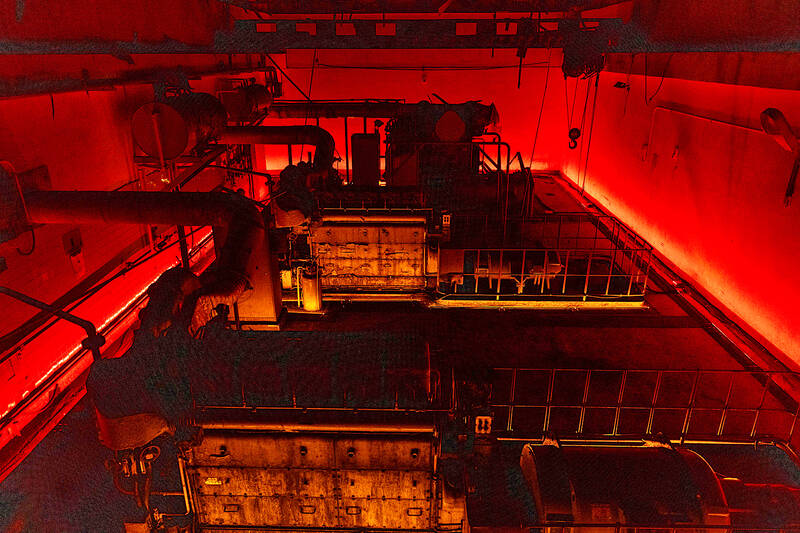A former military power plant on Matsu archipelago is bathed in an ominous crimson light — an art installation reminding visitors of the ever-present threat of a Chinese invasion.
The exhibit titled “Your Country Needs You: Glory of ‘Jun Hun’” — which means “military spirit” — is part of the Matsu Biennial, which runs until the middle of this month.
Some of the works displayed across Matsu — a chain of rocky islands 20 minutes by boat from China’s eastern coast — focus on its natural beauty, but there were also artists, like light designer Liu Ping-yi and his partner Annie Chu, who chose to capitalize on the outlying islands’ wartime history.

Photo: Annabelle Chih, AFP
“We wanted to use light to let the visitors return to a period in the past, and understand how the soldiers and civilians lived on the island then,” said Liu, who collaborated with a sound artist on the power plant installation. “I hope they can imagine what Matsu was like during wartime.”
The islands were key military strongholds for Chinese Nationalist Party (KMT) forces after they fled China in 1949 following defeat in the Chinese Civil War.
Sporadically shelled by China, the KMT ramped up Matsu’s fortifications, constructing underground tunnels and air raid shelters, while coastal outposts had narrow openings so that soldiers could fire in the direction of China.

Photo: Annabelle Chih, AFP
Today, many of these military structures are abandoned, although some of the tunnels have been restored and are open to the public.
For the biennial, an air raid shelter now carries soundtracks of the past, while a former military performance hall showcases cut-out Chinese characters strung together — taken from letters sent to service personnel and residents on the islands.
A whale-shaped wire structure is erected on a beach, fashioned out of old Matsu ships with navy vessel accents.
“Matsu is a tourism-oriented county,” said Lienchiang County Commissioner Wang Chung-ming (王忠銘), who takes issue with his home being labeled a “frontline island.”
“Matsu needs to move toward the concept of an island museum,” Wang said.
Beijing has held massive military exercises around the islands in the past year, including one in April that saw warplanes and naval vessels simulate encirclement of Taiwan. For the residents of Matsu, which was the closest Taiwanese territory to April’s drills, life often goes on without skipping a beat in the face of such war games.
Artist Chao Kai-chih, who helped curate the biennial’s installations, said local residents are “not scared of verbal threats by China.”
“Come if you have the guts,” he said — before quickly switching course and quipping that if China were to invade, “you can attack a bit further — attack Taiwan, don’t attack Matsu.”
Growing up in Matsu under the military administration had many restrictions, said Chao, 66, describing a 9pm curfew and not being allowed on the island’s beaches.
“We want peace, we don’t want war and what we can do is to turn Matsu into an art island,” Chao said.
Wang’s hope is that the biennial would bring the islands some much-needed tourism dollars, as three years of border restrictions due to the COVID-19 pandemic have meant a loss in visitors and income.
“Now we have to slowly restart the negotiation process from the perspective of tourism and cargo goods,” Wang said. “Politically, we must follow Taiwan, but economically Matsu must integrate with China.”

An essay competition jointly organized by a local writing society and a publisher affiliated with the Chinese Communist Party (CCP) might have contravened the Act Governing Relations Between the People of the Taiwan Area and the Mainland Area (臺灣地區與大陸地區人民關係條例), the Mainland Affairs Council (MAC) said on Thursday. “In this case, the partner organization is clearly an agency under the CCP’s Fujian Provincial Committee,” MAC Deputy Minister and spokesperson Liang Wen-chieh (梁文傑) said at a news briefing in Taipei. “It also involves bringing Taiwanese students to China with all-expenses-paid arrangements to attend award ceremonies and camps,” Liang said. Those two “characteristics” are typically sufficient

The brilliant blue waters, thick foliage and bucolic atmosphere on this seemingly idyllic archipelago deep in the Pacific Ocean belie the key role it now plays in a titanic geopolitical struggle. Palau is again on the front line as China, and the US and its allies prepare their forces in an intensifying contest for control over the Asia-Pacific region. The democratic nation of just 17,000 people hosts US-controlled airstrips and soon-to-be-completed radar installations that the US military describes as “critical” to monitoring vast swathes of water and airspace. It is also a key piece of the second island chain, a string of

A magnitude 5.9 earthquake that struck about 33km off the coast of Hualien City was the "main shock" in a series of quakes in the area, with aftershocks expected over the next three days, the Central Weather Administration (CWA) said yesterday. Prior to the magnitude 5.9 quake shaking most of Taiwan at 6:53pm yesterday, six other earthquakes stronger than a magnitude of 4, starting with a magnitude 5.5 quake at 6:09pm, occurred in the area. CWA Seismological Center Director Wu Chien-fu (吳健富) confirmed that the quakes were all part of the same series and that the magnitude 5.5 temblor was

The Central Weather Administration has issued a heat alert for southeastern Taiwan, warning of temperatures as high as 36°C today, while alerting some coastal areas of strong winds later in the day. Kaohsiung’s Neimen District (內門) and Pingtung County’s Neipu Township (內埔) are under an orange heat alert, which warns of temperatures as high as 36°C for three consecutive days, the CWA said, citing southwest winds. The heat would also extend to Tainan’s Nansi (楠西) and Yujing (玉井) districts, as well as Pingtung’s Gaoshu (高樹), Yanpu (鹽埔) and Majia (瑪家) townships, it said, forecasting highs of up to 36°C in those areas